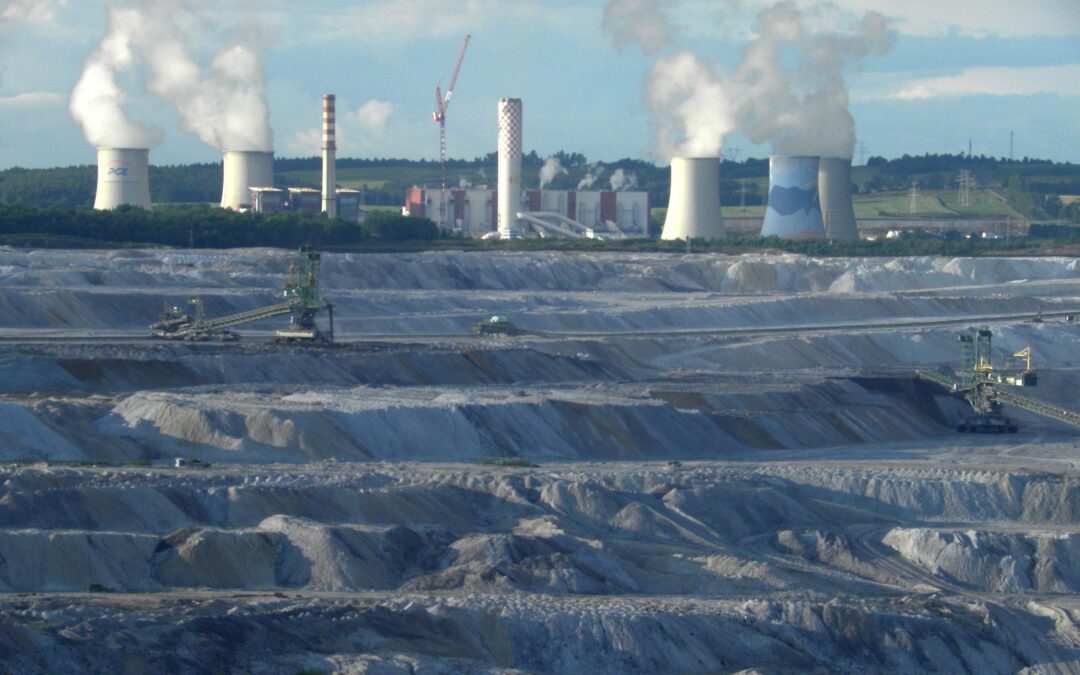By Paweł Wiejski
In the first case of its kind, the Czech Republic is taking Poland to the Court of Justice of the EU to stop the expansion of a coal mine. The dispute threatens relations between the neighbours, and could have a significant impact on Polish energy security and environmental policy.
On Monday this week, the Czech government announced that it will file a lawsuit against Poland at the Court of Justice of the European Union (CJEU) over plans to expand operations at the Turów lignite mine on the Polish side of the border. Prague has accused the Polish government of violating EU law by extending a permit for the mine to operate without properly examining the environmental consequences.
According to a statement from the Czech foreign ministry, the lawsuit will be filed in late February or early March. The Czechs have also asked for the suspension of mining in Turów as an interim measure until a final verdict is handed down by the European court.
A fortnight ago, the Czech foreign minister, Tomáš Petříček, visited Warsaw in a last-ditch effort to negotiate a compromise. But the talks “did not turn out as hoped”, he announced on Monday.
The lawsuit will be the first of its kind, as no EU country has ever been taken to the Court of Justice by another member state over breach of environmental laws. The dispute may force the Polish government to speed up transition away from coal in the region. Along the way, however, it could lead to a loss of EU funds, disruptions to its energy supply and bruised relations with one of its few regional allies on energy matters.
Taken by surprise
The lawsuit caught Poland unaware. “It was a surprise for us, because our impression after the meeting was good,” Aleksander Brzózka, spokesman for Poland’s climate and environment ministry, told Notes from Poland. “There were proposals on the Czech side, we did not answer immediately, but we were and we still are willing to find a solution without a dispute in the court.”
The mine’s operator, state-owned Polish Energy Group (PGE), was equally taken aback. “We do not fully understand it”, said Sandra Apanasionek, the company’s spokeswoman, adding that the Czech side has been regularly consulted in the process of granting the mine its new permit until 2026.
While the decision to sue Poland may be surprising, the conflict had already been simmering for a while. The Turów mine is located close to the Czech and German borders, and the nearby regions have regularly complained about the open-pit mine’s impact on the local environment.
In September last year, the Czech Republic brought the issue to the European Commission, which in December said that, while environmental concerns were “unfounded”, Warsaw had indeed violated a number of EU laws by not properly consulting its neighbours before extending the mine’s permit.
“It was brewing for quite a while,” said Radosław Gawlik of EKO-UNIA, an environmental NGO. He listed numerous signs of an impending lawsuit: “citizens’ complaints, … involvement of the Czech government, visits, Czech media describing the situation, the September decision of the European Commission. Finally, they decided to go through with it.”
Polluting the neighbourhood
For citizens of Uhelná, a Czech village right across the border from Turów, the mine is a real worry. “If the wind goes from the mine to us it can be really noisy, to such a level that people don’t want to be outside,” said Milan Starec, a resident of the village who has been protesting the mine for years. In recent years, excavations have crept closer, with plans to come within 100 metres of the border.
While noise and air pollution are problematic, Czech and German officials and activists agree that the most serious issue is water supplies. For Starec, the rate of decline of groundwater reported recently by the national geological agency is “very scary”. Before announcing its intention to sue, the Czech government demanded compensation from Poland for groundwater loss, as well as financing investment in water supply to the villages neighbouring the mine.
Both Poland’s climate ministry and PGE have vehemently denied accusations that the mine lowers water levels.
“For a long time geologists from Poland and from the Czech Republic have been examining waters sources on the Czech side of the border, and the result of that research confirmed that the mine may have influence on just one water source on the Czech side,” said Apanasionek, adding that construction of an underground barrier is being finalised to prevent any possibility of groundwater loss in the future.
“Catastrophic” either way
The proceedings at the Court of Justice may take several years. If the CJEU sides with Prague, Warsaw may have to pay millions of euros in fines for breaching EU law.
But within just weeks after the lawsuit is filed, the court will decide whether or not to impose interim measures, which could halt the mine’s operations until the final verdict. Such measures have been used in the past, for example in the case of Białowieża forest in 2017, when the court ordered Poland to immediately stop logging.
“I cannot imagine such a scenario. The effects of such a decision would truly be catastrophic,” said Apanasionek. “The Turów plant provides around 5% of national electricity supply. Shutting down the mine would result in shutting down the electric plant.”
Coal stockpiles grow in Poland amid lockdown, rising electricity imports and shift to cleaner energy
Switching off 5% of Poland’s electricity supply overnight would hit the Polish grid – which is already overstretched to meet the growing energy demand – hard. Poland has increasingly imported electricity, with 13 TWh coming from neighbours in 2020 – mostly from Germany.
The climate ministry did not want to comment on the possibility of the imposition of interim measures before the lawsuit is submitted to the CJEU.
Tough choices ahead
In order to solve this conflict, the Polish government faces some difficult choices: it can either press on with the current strategy of kicking the can down the road, or speed up its green transition and face the anger of workers and companies in the coal sector.
“No matter how this ends, we need to bring forward the decision to shut down the plant, for example in ten years,” said Gawlik, adding that the closure of the mine is inevitable due to increasing pressure to switch to renewable energy sources.
Yet, while PGE’s extended permit for the mine expires in 2026, the climate ministry is already considering a new one that would last until 2044, when the coal is forecast to run out.
The utilities giant has confirmed that it will transition to the green energy sources eventually, but Apanasionek says “we need time to transform the region in a way that will have the least impact for the local society. Along with the mining, we will develop a number of investments in renewables. We will build solar and wind farms.”
Regardless of the result of the upcoming legal dispute, the Turów mine has already cost the region access to EU funds. An EU official confirmed to Notes from Poland that it will not have access to a new Just Transition Fund, which is supposed to support green transition in coal-heavy regions, if it does not demonstrate that it is weaning off coal this decade.
In Brussels, Poland and the Czech Republic have often spoken in unison on energy matters, for example advocating for the inclusion of gas and nuclear energy on the list of the EU’s sustainable investments. But bad blood over the Turów mine may weaken that alliance and leave Poland – the only country that has not accepted EU’s climate neutrality goal – even more isolated than before.
Main image credit: Jiří Bernard/Wikimedia Commons (under CC BY-SA 3.0)





















